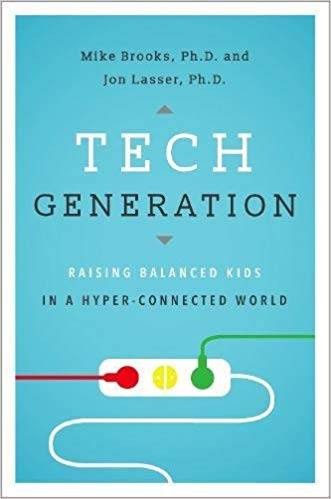Smartphones and Smarter Parenting
Yvonne Rhodes | August 15, 2018

Dr. Jon Lasser is teaching parents how to raise their children with technology
Imagine being unable to concentrate, prioritize, or control passing impulses. These skills are important to social and emotional and cognitive health, but research is showing that parents might be using technology to replace or reduce critical parenting practices. Instead of calming a child who has been hurt or upset by giving them a hug or close attention, for example, today’s new parents may just as readily let them play a game on a smartphone. This helps the parents de-escalate a frazzling situation, but constant interaction with screens and social media shortens attention spans, which takes a toll on a child’s ability to make personal connections and form healthy relationships.

Millennials are digital natives, so interaction with a smartphone is second nature, but do they know how to regulate screen time for their young children? Dr. Jon Lasser, Associate Dean of Research for the College of Education at Texas State University, has been studying this question and has a new book to address this subject, “Tech Generation: Raising Balanced Kids in a Hyper-Connected World.”
“The inspiration for this work was born 16 years ago when I was working as a public school psychologist,” explained Lasser. “I saw students glued to their phones and wondered in those early days of smartphone proliferation, what cognitive or emotional effects, positive or negative, the technology was having.”
“Tech Generation” synthesizes Lasser’s, and his co-author Dr. Mike Brooks’, extensive research on cognitive science and evolutionary psychology into a practical guide for millennial parents. It dives into the mental health effects of technology over-use and offers guidance for teaching kids to regulate their technology use effectively.
What is, for example, a productive way to limit the screen time of a child who loves to play video games? Lasser says, “Balance is the key. Parents need to engage their children with questions like, “What do you think is a good amount of time to spend playing video games, while getting all of your other homework and chores done?” This kind of interaction helps children reason through their priorities and allows them to set their own limits, both of which are important executive level thinking skills. The book provides a method for families to assess their screen time use together, called “FAST,” which stands for Family Assessment of Screentime Use.
Tech Happy Life Model
Green level: Provides diagnosis and prescriptions for knowing when and how to regulate screen time
Yellow level: Monitor child’s tech usage when behaviors indicate addiction or negative psychological effects
Red level: Describes addiction to technology and explains long-term negative effects for children

Understanding different levels of technology use can also be helpful to parents. In their work, Lasser and Brooks developed an intuitive model to assess a child’s usage using green, yellow and red levels to correspond to degrees of use, and the book’s cover provides an illustration of the model. Lasser explained, “Attention-span issues are preventable by simply being proactive with a child. The green level in our model provides both diagnosis and prescriptions for knowing when and how to regulate screen time.” Yellow-level behaviors in the model are indicators of addiction or negative psychological effects. If parents are noticing negative psychological effects, they can, using Lasser’s guidance, monitor their child more closely and move to limit screen time. The red level of the model describes addiction to technology and explains the long-term negative effects for children. Red level addiction may require professional help to reverse.
Dr. Lasser said, “To be fair, technology is quite helpful. We use it every day and it helps us be productive, but like so many things, it can be too much of a good thing. Our goal with ‘Tech Generation’ was to teach parents to successfully moderate, rather than restrict children’s screen time.”
College students can benefit from Dr. Lasser’s work as well. The freedom of college life allows students to spend time on streaming platforms, social sites and with video games at virtually any time and place. Lasser encourages students to be aware of how much time a student is spending immersed in online activity. “If it’s starting to interfere with a student’s studies, or if someone finds themselves feeling negative or jealous of a peer online, then it’s advisable to cut back,” he said.
This fall, Dr. Lasser will teach Texas State graduate students “Interviewing, Counseling, and Consulting in School Psychology.”
Share this article
For more information, contact University Communications:Jayme Blaschke, 512-245-2555 Sandy Pantlik, 512-245-2922 |